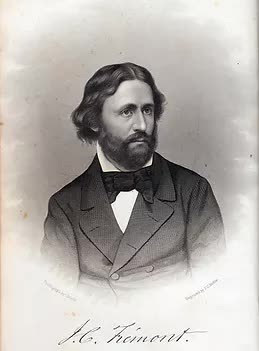General John C. Fremont
Known as the Man Who Mapped the West
John Fremont was one of the most famous explorers of the American West, a soldier and an intriguing political figure of that time. He was born in Savannah, Georgia in 1813. When he was 25 he joined the Army Topographical Engineers Corps in 1838 and in 1839 Fremont joined a surveying party that mapped the upper Mississippi and Missouri rivers.
In 1842 Fremont mapped most of the Oregon Trail and climbed the second highest peak (13745 feet) in the Wind River Mountains of Wyoming, afterwards known as Fremont Peak.
The Oregon Trail was the only feasible corridor to the western United States. The places we now know as Washington, Oregon, California, Nevada, Idaho and Utah would probably not be a part of the United States today were it not for the Oregon Trail.
In 1843, along with Kit Carson, Fremont's party made a midwinter crossing of the Sierra Nevada Mountains. In 1845 he explored the Great Basin and the Pacific coast. During the exploration the Mexican War started and Fremont was given the rank of major in the United States Army and helped in the annexation of California. He was appointed governor of California until 1847 when he clashed with General Kearney and was arrested and court-martialed for mutiny and insubordination. President Polk intervened and Fremont was released.
During the Californian Gold Rush of 1848 gold was discovered on his land and he became a multi-millionaire. In 1850 Fremont became one of the State’s first two senators. On the outbreak of the American Civil War Fremont was appointed as a Major General in the Union Army and put in command of the Western Department based in St. Louis.
At the end of August, 1861, Freemont proclaimed that all slaves owned by Confederates in Missouri were free; an independent political action that led to his sacking by Abraham Lincoln. The sacking prompted Horace Greeley, editor of the New York Tribune to write an open letter to President Lincoln defending Fremont and criticizing Lincoln for not making the abolition of slavery the imperative issue of the war. Lincoln famously replied: "My paramount object in this struggle is to save the Union, and is not either to save or destroy slavery. If I could save the Union without freeing any slave, I would do it; and if I could save it by freeing all the slaves, I would do it."
After the American Civil War Fremont became involved in railroad financing and lost the fortune he had made during the Californian Gold Rush. He was elected governor of Arizona Territory (1873-83). John Fremont died in New York City in July 1890 aged 77.
Allan Nevins, Frémont, Pathfinder of the West, 1955.
Andrew Rolle, John Charles Frémont: Character as Destiny, 1991
FIND US
Whether you are traveling east or west simply take exit 255 from I-80, turn south towards the mountain and find us after 3 miles just beyond the town and left over the old bridge.
Please note that our parking lot has difficult access for long trailers or extra large vehicles. For peace of mind, please do not bring either of those into our parking lot. Instead please park along the access road near the dumpsters. Thank you!
CONTACT US
We will get back to you as soon as possible.
Please try again later.
© 2020 the Historic Elk Mountain Hotel
